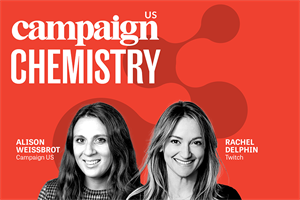"People are looking to brands for leadership on sustainability – and what they want is not being met so far. Brands should leverage this moment of increased attention and awareness."
Michael Horn, chief data officer at Huge was speaking at a Campaign-Huge hosted dinner discussion for senior marketers in Orlando, Florida. The conversation explored how marketers can be champions for more sustainability practices, and was chaired by Campaign US editor Lindsay Stein.
Huge has carried out consumer research on sustainability and shared key findings from the study. Marketers from leading brands Sony, Bacardi, MassMutual and Chobhani came together to discuss the findings and share ideas on how they can harness their power to make the world a better place.
Here’s some of the key takeaways:
1. People are looking to governments and businesses to make an impact
Huge’s study found that while 45 per cent of consumers report taking time to research climate change in the last month, only 25 per cent report changing their habits, while one fifth say they’ve chosen to pay more for a more sustainable product in the past month to combat the issue.
Consumers feel that the amount of change that needs to happen right now is beyond them believes Leland Maschmeyer, chief creative officer at Chobhani: "That’s why it does come to governments and businesses to make a difference."
Jennifer Halloran, CMO at MassMutual, said she hears a lot of customers say they can’t solve the problem as it’s "too big".
But that doesn’t mean they don’t care about change, believes Jessica Merz, Director of Global External Corporate Communications at Bacardi: "Consumers care and my hope is that they keep asking for the change, so much that it forces companies and governments to make the change happen."
Horn believes there are beacons of passion in every company to make a change but warned people can still feel reluctant about expressing it.
"We need to remove the stigma of people feeling fear of asking questions in companies, governments or communities. People must feel empowered to ask questions – to their bosses, colleagues and to their supply chains."
2. Brands have massive reach and they should focus on championing change, not 'clever marketing'
Brands have huge social influence – but they should use it sensibly. Huge’s research study showed that brands actually have more influence than the US government and political leaders at the moment.
They also found that heavy media coverage of the UNGA and activist Greta Thunberg’s recent Climate Strike barely shifted the percentage of Americans who consider climate change to be an important issue (3 per cent).
While this coverage engages those people who already care about the issues, it's not doing enough to bring the issues to new audiences. This is where brands come in, believes Horn: "They impact millions of lives and can affect change, from the outside in."
Merz warns that some brands are using sustainability initiatives just because it’s "clever marketing", not because they are truly changing their practices. "I have a problem with that, you have to change inside the business – behind the scenes – not just care about it outside in your comms to win people over.''
Douwe Bergsma, former CMO at Georgia-Pacific Consumer Business shares this scepticism that some brands talk loudly about sustainability, but it is not always those that have the most sustainable practices. "At Georgia-Pacific, we did a lot but we didn’t talk about it. Whereas other brands do less but talk about it more and so they are seen as being more sustainable."
3. Sustainability shouldn’t be a differentiator, it should eventually be table stakes
The marketers agreed that they hope sustainability won't be a differentiator for brands in the future.
Jennifer Frommer, SVP, brand partnerships & licensing at Columbia Records, a division of Sony Music, believes that in ten years’ time, sustainability practices will be commonplace.
"Gen Z and millennials will be leading companies and it will be commonplace for them, as they’ve grown up with it being front and centre. I think there will be sustainability across the board and it will just become what happens in businesses. I think change is going to come."
4. Look at brands walking the walk
There’s a role for brands to be more accountable and to drive change from the outside in, said Horn. He cites Nike as an example of a brand doing this already.
"Nike has been carrying out a lot of research to tap greater sustainability and open sourcing it to the apparel industry. They are sharing this very valuable knowledge with the entire market to drive better practices for everyone, which is very encouraging."
Merz said her company has also been committed to driving change, starting with eradicating plastic straws: "We have a bar in every Bacardi office and I realised that we didn’t need to use plastic straws anymore, back in 2016. So I sent a global email to say can we not use plastic straws in any of our office and it really took off. Now we don’t use plastic straws."
Merz said the straws were also a catalyst for the business to start finding other ways to become more sustainability:"People weren’t talking about it and it wasn’t in the media back then, in 2016, but we felt it was the right thing to do."
Bergsma said he admires what Unilever has done on sustainability: "They put it at the forefront of their business – it’s in their purpose statement right at the beginning – and they rolled it out to all of their brands. And they did this before it was ‘in fashion’".
5. No brand or business will ever be perfect so don’t hide the positive steps you are making
Some marketers around the table agreed there is some fear around talking about what they’re doing on sustainability – because while they are making steps forward, there’s still much improvement to be made.
Halloran believes brands need to stick with their sustainability drive: "Keep going even when you don’t get the credit. There are phenomenal companies out there making more progress than others, like Patagonia, but there will still be some people out there thinking they’re not doing enough, but what is enough? We have to carry on and keep making steps."
Frommer agreed that companies shouldn’t be embarrassed if they are making progress: "If companies are doing amazing work to be better they should shout about it and not feel ashamed.''
6. Unless there’s an economic incentive to change, businesses – and people – won’t
Pete Stein, CEO at Huge believes that change is going to have to come at a systemic level: "If you’re a CEO of a company – unless there’s an economic incentive to drive change – it’s not going to happen at the pace we need it to."
Eric Danetz, global chief revenue officer at Accuweather shared this sentiment: "My motivation at the end of the year is to hit KPIs, that’s what keeps my job. So fundamentally we need to look at how to change the economics of sustainability."
Merz said Bacardi looks at the big picture and everyone has a shared goal to improve the company’s sustainability: "Our products depend on clean water – so we have a real incentive to take environmental issues seriously. Sustainability is something that we’re all held responsible for."










